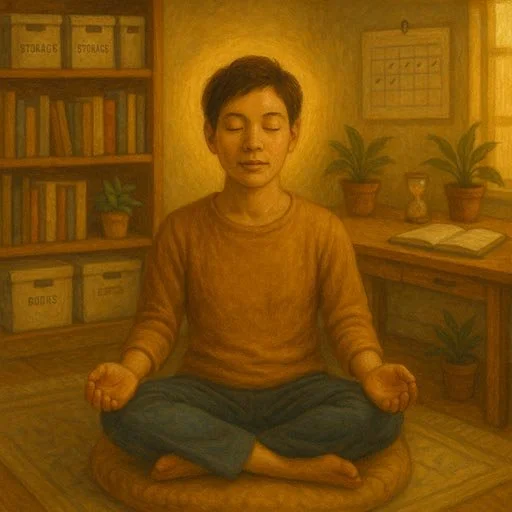Meditation for Burnout Recovery: Healing Chronic Stress with Mindfulness
Author: Dr. Timothy Rubin, PhD in Psychology
Originally Published: January 2025
Last Updated: January 2025

Meditation and mindfulness practices offer evidence-based pathways to heal from chronic stress and emotional exhaustion.
Contents
- Understanding Burnout: More Than Just Stress
- The Physical and Mental Toll of Burnout
- Mindfulness: An Evidence-Based Solution
- Proven Meditation Techniques for Recovery
- Building Sustainable Recovery Routines
- How Digital Tools Can Support Your Journey
- Getting Started with Recovery
- FAQ: Meditation for Burnout Recovery
Burnout isn't just feeling tired—it's chronic stress overload that leaves you emotionally drained and struggling to function. The World Health Organization defines burnout as a syndrome from unmanaged workplace stress, marked by exhaustion, cynicism, and reduced effectiveness.
The statistics are staggering. About 57% of U.S. workers have experienced burnout, with women reporting higher rates than men. Remote work has intensified the problem, with 69% of remote employees reporting increased burnout due to constant digital demands.
The good news? Research shows that meditation and mindfulness practices can significantly reduce burnout symptoms and help restore your energy and well-being.
Understanding Burnout: More Than Just Stress

Burnout manifests through three key dimensions: emotional exhaustion, detachment, and decreased performance.
Burnout differs from regular stress in three key ways. Emotional exhaustion means feeling completely drained by work demands. Cynicism or detachment involves negative attitudes toward your job or feeling numb. Reduced efficacy shows up as decreased performance and feelings of incompetence.
Unlike temporary stress, burnout develops over months or years of chronic overwhelm. It's become so common that researchers call it a "burnout epidemic," particularly affecting healthcare workers, teachers, and remote employees.
The Physical and Mental Toll of Burnout
Burnout isn't "just in your head"—chronic stress literally changes your brain and body. Neuroscience research shows that long-term stress reduces gray matter in areas crucial for memory and decision-making.
Physically, burnout keeps your cardiovascular system in overdrive. One major study found that people with severe burnout had a 79% higher risk of developing heart disease compared to their less-burned-out colleagues.

Chronic stress from burnout affects multiple body systems, from brain structure to cardiovascular health.
Common physical symptoms include sleep disturbances, frequent headaches, and weakened immunity. Emotionally, burnout often leads to irritability, withdrawal from activities, and unhealthy coping mechanisms like excessive alcohol use or emotional eating.
Mindfulness: An Evidence-Based Solution
Mindfulness meditation directly counteracts the stress response underlying burnout. By training your attention on the present moment without judgment, you activate your body's natural relaxation response.
Research with healthcare professionals found that an 8-week mindfulness program led to a 26% reduction in burnout symptoms. Among nurses specifically, symptoms dropped by 36%.
Self-compassion is equally powerful for burnout recovery. Instead of harsh self-criticism ("I should be doing more"), self-compassion involves treating yourself with the same kindness you'd offer a friend. Studies consistently show that higher self-compassion correlates with lower burnout and emotional exhaustion.
Proven Meditation Techniques for Recovery

Simple meditation techniques can be practiced at home to support burnout recovery and stress reduction.
Body Scan Meditation
This foundational practice involves mentally scanning your body from head to toe, noticing sensations without trying to change them. Body scans help shift focus from racing thoughts to present-moment awareness, releasing physical tension and calming your nervous system. For sleep-related benefits, see our guide on meditation for better sleep.
Loving-Kindness Meditation
This heart-centered practice generates compassion for yourself and others. You silently repeat phrases like "May I be safe, may I be healthy, may I live with ease." Loving-kindness meditation increases positive emotions and reduces self-criticism, helping counteract burnout's cynicism and detachment.
Breathing Exercises
Simple breath-focused practices like the 4-7-8 technique (inhale for 4, hold for 7, exhale for 8) quickly activate your relaxation response. These can be done anywhere and provide immediate stress relief during overwhelming moments.
Mindful Movement
Gentle yoga, walking meditation, or mindful stretching combine physical activity with present-moment awareness. Movement helps release stored tension while providing mental clarity and emotional regulation.
Building Sustainable Recovery Routines
Burnout recovery requires consistent, restorative habits beyond formal meditation. Think of recovery as gradually replenishing your depleted energy reserves through multiple approaches.
Prioritize Rest and Boundaries
Adequate sleep (7-9 hours) is non-negotiable for healing. Set clear work-life boundaries, especially if working from home. Research on psychological detachment shows that truly disconnecting from work during off-hours significantly reduces stress and burnout.
Digital Detox Strategies
Constant digital connectivity keeps your brain in vigilance mode. Implement tech-free periods, such as avoiding screens for the first hour after waking or after 9 PM. Studies show 81% of remote workers check email outside work hours—breaking this habit is crucial for recovery.
Nature and Social Connection
Even 20 minutes in nature can significantly lower cortisol levels. Combine outdoor time with social support—positive relationships are among the strongest protective factors against chronic stress.
How Digital Tools Can Support Your Journey

AI-powered wellness tools can provide personalized support when you're too overwhelmed to know where to start.
When you're severely burned out, even deciding how to help yourself feels overwhelming. AI-powered wellness tools can provide 24/7 personalized guidance tailored to your specific stress levels and needs.
Research on AI-based mental health support shows significant reductions in distress and depressive symptoms compared to no treatment. These tools can suggest appropriate practices, generate custom meditations, and provide gentle encouragement when motivation is low.
For example, Wellness AI combines therapeutic conversations with personalized meditations created specifically for your situation. When you're feeling overwhelmed, you can describe your state and receive both emotional support and a custom meditation designed for burnout recovery.
Getting Started with Recovery
Begin with small, manageable steps. If formal meditation feels overwhelming, start with three deep breaths when you feel stressed. Gradually build to 5-10 minutes of guided practice daily.
Consider combining approaches from cognitive behavioral therapy with mindfulness practices. This integrated approach addresses both thought patterns and stress responses that contribute to burnout.
Remember that recovery is a gradual process. Be patient with yourself and celebrate small improvements. Most people notice some benefits within 2-4 weeks of consistent practice, with significant improvements developing over several months.
-Tim, Founder of Wellness AI
About the Author
Dr. Timothy Rubin holds a PhD in Psychology with expertise in cognitive science and AI applications in mental health. His research has been published in peer-reviewed psychology and artificial intelligence journals. Dr. Rubin founded Wellness AI to make evidence-based mental health support more accessible through technology.
FAQ: Meditation for Burnout Recovery
What are the signs of burnout?
Burnout's main symptoms are emotional exhaustion, cynicism or detachment, and reduced work performance. People often experience sleep problems, difficulty concentrating, and may feel drained or overwhelmed by daily tasks.
How can meditation help with burnout recovery?
Meditation activates the body's relaxation response, lowering stress hormones like cortisol. Regular practice helps rebuild emotional resilience and improves your ability to manage work stress without becoming overwhelmed.
How long does burnout recovery take?
Recovery varies from weeks to several months depending on burnout severity. Mild burnout may improve within 2-4 weeks of consistent self-care, while severe burnout typically requires 3-6 months of dedicated recovery practices.
What if I'm too exhausted to meditate?
Start with just 2-3 deep breaths or use guided meditation apps that require minimal effort. Focus first on basic needs like sleep and nutrition, then gradually introduce short meditation practices as energy returns.
Should I see a therapist for burnout?
If burnout is causing depression, inability to function, or thoughts of hopelessness, seek professional help immediately. For moderate burnout, self-care and digital support tools may be sufficient, but therapy can provide valuable guidance and accountability.
Can burnout lead to serious health problems?
Yes, chronic burnout increases risk of heart disease, diabetes, and mental health conditions. It's important to take burnout seriously and implement recovery strategies rather than continuing to push through exhaustion.